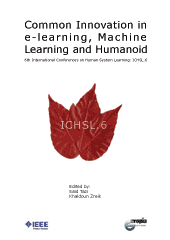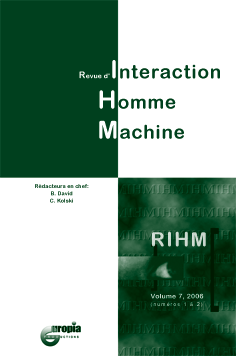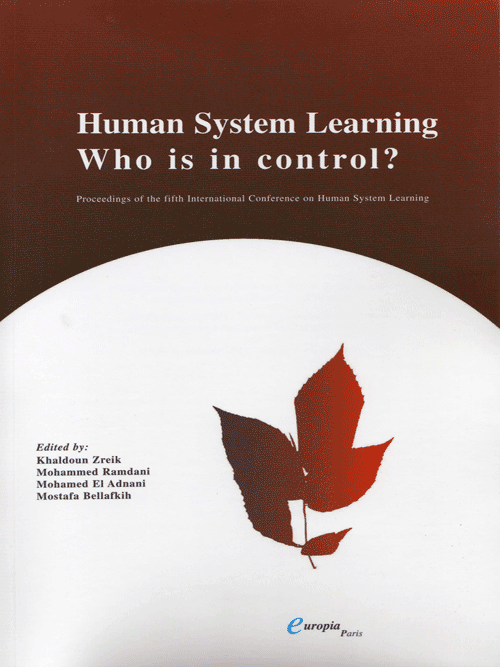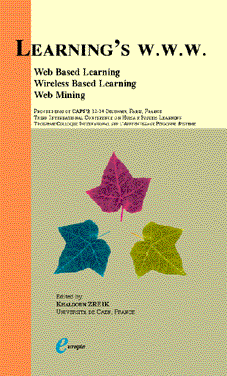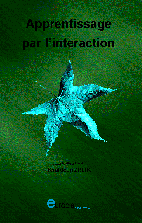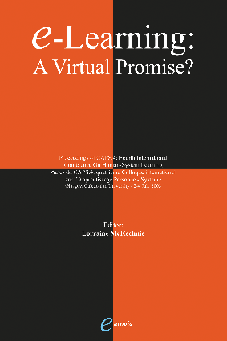Contents
McKechnie, L. Editorial
Salmon, G. KEYNOTE ADDRESS : Sleight of Hand and Twist of Fate
Section one: Pedagogy & Flexible Learning
Affleck, G. Identifying a Need for E-Support
Bartlett-Bragg, A. Blogs - Enhancing Reflection in e-Learning The use of Chat and the Discussion Forum
Edirisingha, P., Heaton-Shrestha, C. and Kelly, P. Widening access and increasing success in higher education: potentials of Virtual Learning Environments
Forbes, D. Formative Interaction in Online Classes
Macdonald, J. Supporting E-Learners at the Open University in Scotland
McAllister, J. and Wilson, R. Pedagogy and Flexible Learning
Nisbet, D. The Facilitation of Group Interaction in e-Learning Programmes in an International and Multi-cultural Environment
O’Hare, D. & Mackenzie, D.M. Advanced Computer Based Assessment-Enhancing the Quality of Teaching Provision
Palmer K. and Richardson, P. On-line Assessment and Free-Response Input – a Pedagogic and Technical Model for Squaring the Circle
Pinder, S. & Thomson, C. Small business, big challenge:
Developing good practice in ICT-supported learning in SMEs
Roberts, G. and Siddiqui, S. From lecturer to e-tutor: Tales of transition
Srdanovic´, V. Some Implications of Technology in E-Learning: An Opportunity and a Challenge
Section two: Management, Organisational &
Behavioural Issues
Allan, J. & Lawless, N. Stress caused by on-line collaboration in elearning: a scoping study
Bartlett-Bragg, A. Preparing for the Future – Initiatives introduced by a University to address the demands of e-Learning in an Organisational Context.
Bender, D. M. Attitudes of Faculty Toward Distance Education
Combe, C. The Development of Distance Learning and Teaching Applications using the Internet: Understanding Problems and Creating Solutions
Helliar, C., Monk, E. & Stevenson, L. Accounting academics’ perceptions of the use of computers in learning and teaching auditing
Krayer, A, Thomas, A., Iphofen, R. & Allsup, D. Implications for integrating learning technologies into university teaching. A case study.
Lee-Kelley, L. Blackman, D & Good, B. The implications of strong mental models on innovation in e-learning: a case study
Lennon, K. Management Programme By A Multi-Disciplinary Team
Michaelson, R. 'E' with everything
Raffelini, C. From teletraining to e-learning. A case study on the evaluation of teletraining activities by videoconference at the Centre Hospitalier of University of Montreal (CHUM) in Canada.
Scott, R. & Duncan, E. An Examination of the Implementation of Managed Learning Environments within Caledonian Business School, Glasgow
Smith, J. ‘Real People’ in Virtual Learning Environments:
supporting and managing individuals in their interaction with online technology
Section three: Tools, Technologies & Systems
Balla, A., Tayed Laskri, M. & Laouidi, S. A Dynamic Adaptive Hypermedia Model guided by Pedagogical Activities
Branki, C., Unland, R., Biegus,L. & Smith, T. A Facilitator Agent in an Electronic Services Market
Cheng, K. F. & Buggy, T. Speech Recognition as
means to enhanced Managed Learning Environments
Despotovic´, M. & Srdanovic´, V. TeekoTeacher: A
Tool for Learning Good Teeko Strategies
Duncan, J. W. The Use of Agents and Avatars in e-Learning
Gray, E. & Temple, B. Virtual Communication - Strengths and Weaknesses
Pacurer, E. G. & Trigano, P. C. Evaluation and Design of
pedagogical hypermedia on the Web
Stewart, I. & McKee, W. Using Voice Recognition Technology to Supplement E-Learning Audio. |

